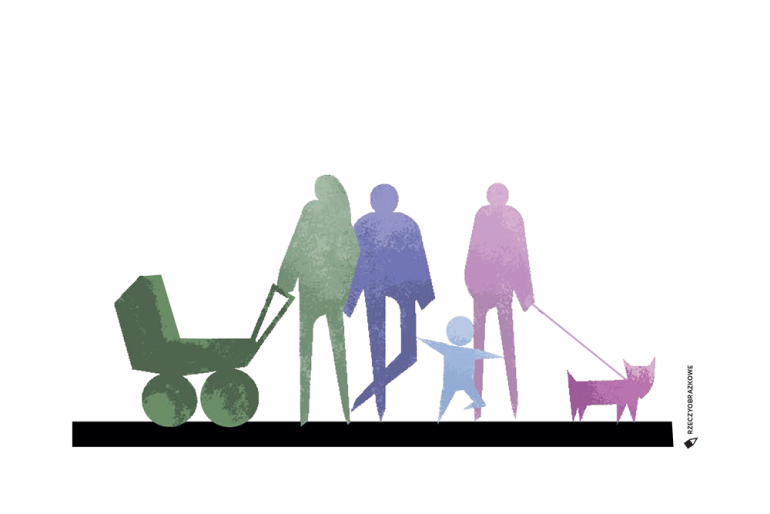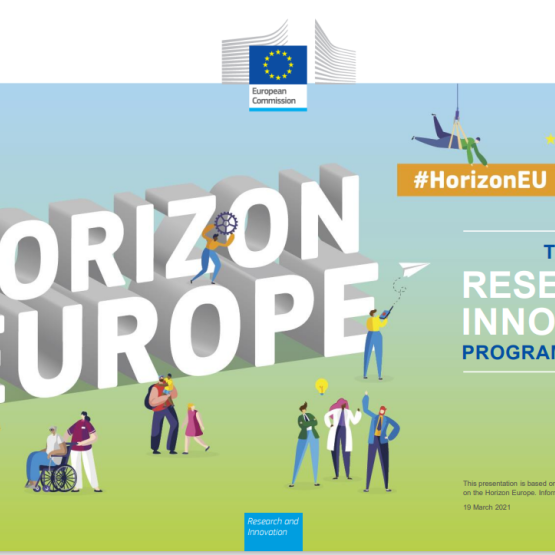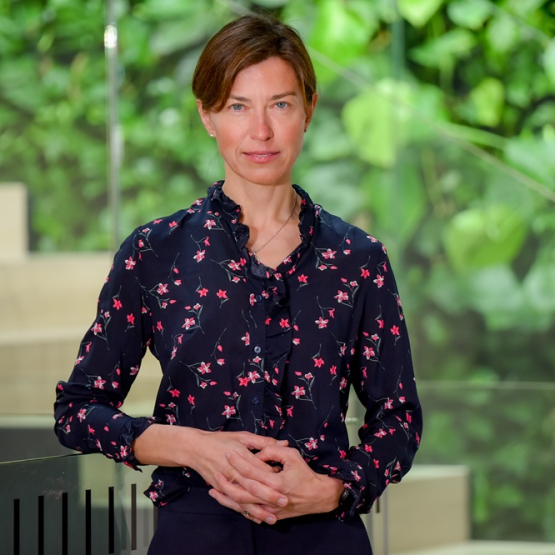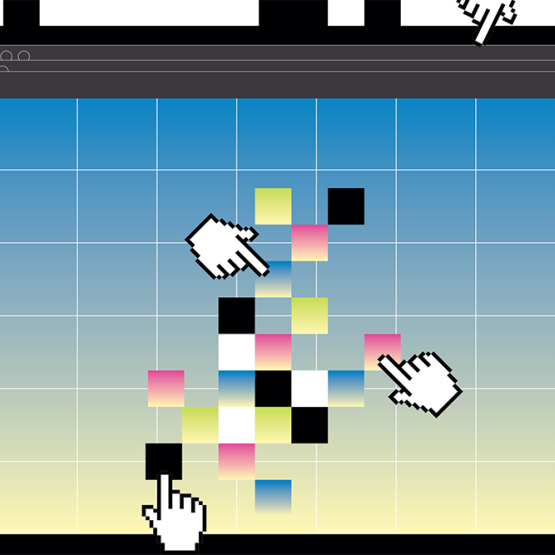
The newly established Families and Generations Lab is the second SGH entity, following the AI Lab, aimed at integrating research activities, crucial for SGH. The task of the Lab is to animate the scientific activity of SGH staff conducting research on family and generational transformations and their impact on the formation of human capital, in particular in cooperation within the framework of European research infrastructures: SHARE-ERIC (Survey of Health, Ageing, and Retirement in Europe) and GGP (Generations and Gender Programme). SGH is the Polish partner of both these infrastructures, responsible for the implementation of the Polish component of these international programmes.
In 2020, SHARE and GGP under the joint aegis of the Polish infrastructure of Research on Families, Generations and Human Capital were included in the Polish Map of Research Infrastructure, along with only five other infrastructures in the social sciences and humanities. This indicates the undeniable importance of research carried out under these SHARE and GGP infrastructures for the development of research in Poland. The lab activities are also in line with the priority directions of research within the SGH scientific policy, namely the study of demographic changes, social transformations, health, inequalities and regional development disparities.
RESEARCH TOPICS
The observed global trends, including primarily demographic changes and population ageing, changes in the labour market, technological changes or climate change, are an important context for public policies, and consequently also for building knowledge to enable evidence-based planning. According to the Eurostat demographic projection [EUROPOP, 2022], in 25 years (from 2025 to 2050), the number of working age population (20–64 years of age) in Poland will decrease from 23.05 million to 18.42 million, and the number of people aged 65 or more will increase from 7.43 million to 10.08 million. In this group, there will also be an increase in the number of the oldest people, over 80 years of age, from 1.62 million to 3.12 million. The number and structure of people in the oldest working age groups (50–64) will also change. Processes related to delayed family formation and parenthood, as well as persistently very low fertility rates, which contribute to changes in the structure of the population, also remain a constant subject of social discourse and interest in public policies. Since 2000, the median age of a woman at the birth of her first child has increased from 23.7 to 28 years, and the total fertility rate has invariably remained below the threshold of very low fertility rate of –1.5, preventing a simple replacement of generations (Demographic Yearbook of the Central Statistical Office, 2024). Therefore, it is important to understand the social changes related to each generation, in the context of the performance of individual people and their families.
The main task of the Lab is to conduct comprehensive, methodically advanced, innovative research on demographic and social changes. This task is carried out in close cooperation, not limited to it though, with the aforementioned international social research infrastructures SHARE and GGP. In 2025, SGH signed a letter of intent with the third social research infrastructure currently being created: GUIDE (Growing Up in Digital Europe), whose ambition is to conduct pan-European research on children and young people.
The research within SHARE, GGP and GUIDE enables the observation of changes occurring among three generations as well as scrutinising on the entire course of life. GUIDE will focus on the early development of the individual, collecting data on childhood and adolescence experiences. GGP focuses on the life course of adults, especially on the dynamics of family formation, development and breakdown. SHARE deals with health, professional activity, conditions and quality of life of people in late adulthood and senior phase of life.
A common feature of these studies is their panel nature, which allows for the study of changes occurring over time. They are affected by broadly understood social and economic processes taking place in Poland, Europe and the world. These studies provide internationally comparable data, which particularly support monitoring and planning of public policies, including primarily health, education, labour market and family policies. These studies account for the life course perspective and allow for the assessment of how various types of activities, especially social investments, affect building of human capital and situations of individuals, families or generations in the long term.
SURVEY ON HEALTH, AGEING AND RETIREMENT (SHARE)
The SHARE survey has been carried out in Poland since 2006 and includes about 6000 respondents. There are subsequent rounds of the survey held every two years – currently the 10th round of the survey is being conducted. The SHARE survey takes place in the form of a face-to-face interview – the interviewers conduct interviews at the respondents’ homes. It allows for objective measurements such as handshake strength, with the use of appropriate instruments. During the COVID-19 pandemic, it was impossible to conduct face-to-face interviews, but in 2020 and 2021, two rounds of SHARE Corona telephone surveys were conducted among panel respondents, which allowed them to collect information on how the pandemic affected the situation of survey respondents – their health, the way they work, social relationships as well as other aspects.
What are the conclusions of the SHARE survey? Based on the results of the 8th round of the survey, conducted in 2020 before the pandemic, we can see that the 50+ generation in Poland is changing (Abramowska-Kmon et al., 2023). First of all, especially among 50 and 60-year-olds, the number of people with higher education is growing, and the economic activity in this group is also on the rise. In general, their health is improving, although the growing percentage of obese people or smokers is a cause for concern. However, prolonged professional activity of people aged 50+, necessary to maintain economic and social potential, requires, above all, activities that create conditions for further work and combining professional work with care, especially for older family members. The work environment should be adapted to the diverse needs and capabilities of the 50+ generation. It is necessary to look for solutions to reduce the performance of strenuous physical work, introduce flexible working conditions, as well as promote and develop work organisation practices that improve job satisfaction of people aged 50+. It is also important to develop competences as part of lifelong learning and increase the participation of people aged 50+ in various forms of learning so that they could acquire new competences, for example digital. The development of technology, including the increasingly widespread use of artificial intelligence, requires the development of these skills. Another area which requires action is health. During the pandemic, there was an accumulation of health debt, which needs to be “repaid” in the form of increased access to tests and health examination. Activities in the area of prevention and public health are particularly important; they prevent the development of a significant part of chronic diseases faced by people aged 50+. Due to the growing number of the elderly, often requiring long-term care, an increase in demand for such services should be expected. Job creation in the care sector can support the activation of people and thus better use of the dwindling labour force.
SHARE research is currently underway in 28 European countries and in Israel.
GENERATIONS AND FAMILIES SURVEY (GGP)
The Generations and Families survey is a short cyclical panel, the full round of which includes three (in the minimal version – two) waves of survey carried out every three years. As part of the first round, two waves of survey were carried out in Poland in the years 2010–2015. The first wave covered almost 20,000 people aged 18–79 and provided detailed information on family biographies, procreative decisions and transformations of family life in Poland.
The results of these studies revealed significant changes in the life course of Poles (Kotowska et al. 2015). Younger generations left their family homes later and later, took up work and set up families. Women’s decisions to give birth to their first child at a later age were associated with a longer period of education and changes in the labour market. Partner models also evolved – more and more people decided to cohabit before marriage. These studies confirmed that the role of women and men in the family and in the labour market was changing. However, it was still women who had more responsibility for household chores and childcare, despite their growing professional involvement. As a result, women face difficulties in reconciling work and family life. These results highlighted the need to adapt family policies and the labour market to the changing realities of family life – but they need to be updated.
The preparatory work is currently underway to launch the second round of the Generations and Families survey, which will be performed on a sample of 10,000 people aged 18–59. Lowering the upper age limit is possible thanks to closer cooperation between GGP and SHARE and the complementarity of their research. The survey will be carried out with a mixed method: online and (like SHARE) in the form of a face-to-face interview. In addition to the topics analysed in 2010-2015, the second round questionnaire will also cover new topics such as flexible and remote working solutions, the experience of migration and uncertainty about the future (also in the context of pandemics or war).
The second round of the GGP programme is being carried out in 19 European countries as well as in Uruguay, Hong Kong and Taiwan.
GROWING UP IN DIGITAL EUROPE (GUIDE)
The ambition of the emerging international GUIDE infrastructure is to establish a pan-European longitudinal cohort study, providing data on psychosocial, educational, health development and equal opportunities and quality of life of children and adolescents, accounting for the challenges and opportunities associated with modern technologies. Pilot studies are currently underway in seven European countries (e.g. Croatia, Finland, France and Italy). The actual research is scheduled to begin in 2027, when children born in 2019 and their parents will be included in the study for the first time. Two years later, it is planned to launch observation of the second cohort of children, born in 2029. Both birth cohorts are to be followed up to the age of 24.
Due to the sample included in the study and its subject matter, the study “Growing up in Digital Europe” is planned and implemented in cooperation with psychologists. In Poland, the Families and Generations Lab will cooperate in this area with developmental psychologists from the Institute of Psychology of the Cardinal Stefan Wyszyński University in Warsaw.
MAIN RESEARCH PROJECTS
Thanks to the participation in European research infrastructures, we build the potential and scientific achievements of SGH. We have been able to participate in the implementation of a number of European and national grants. These include projects
- Non-intended health, economic and social effects of the COVID-19 epidemic control decisions: Lessons from SHARE (SHARE-COVID19), implemented in 2020-2024, within which research was conducted on the broadly understood effects of the pandemic on the 50+ generation, including the economic situation, professional activity, health and intergenerational relations. As part of the project, a monograph was written, co-edited by Doctor Anita Abramowska-Kmon and Habilitated Doctor Agnieszka Chłoń-Domińczak.
- The Generations and Gender Programme Preparatory Phase Project (GGP-5D), implemented in 2022-2026 aimed at transforming the GGP consortium into the European Research Infrastructure Consortium (ERIC). Within this project, Polish researchers can co-create the methodological assumptions of international research and expand their knowledge of the operation of international research infrastructures.
- The Future of European Social Citizenship (EUSOCIALCIT), implemented in 2020–2024, which used SHARE data to study types of family and professional pathways in countries with different social investment models and their impact on the socioeconomic situation of people in the oldest age groups.
- Towards a Resilient Future of Europe (FutuRes), implemented in 2023–2026, under which SHARE and GGP data are used to analyse generational resilience. Using the GGP data, we conducted analyses of the resilience of families in terms of their procreative decisions using GGP data, but also assessed how the resilience of older people can be understood, accounting for their economic situation, health and social relationships.
- Since 2025, we have been involved in the Social Aspects of the Green Transition (SoGreen) project, which will include pilot research as part of GGP, SHARE, as well as preparation for the implementation of the GUIDE study on the consequences of climate change to societies. The SGH team is also involved in the creation of geospatial data, which, combined with data from surveys, can allow for better recognition of the impact of the change on residents.
In conclusion, the establishment of the Families and Generations Lab is an important step towards the integration and coordination of research on demographic, social and intergenerational changes. The Lab will strengthen the SGH research potential and enable even more effective applications for prestigious national and international projects, giving rise to more thorough analyses of key social phenomena. An important aspect of its activity will also be to popularise research results through the organisation of seminars and conferences, in support of scientific development of faculty and doctoral students as well as the exchange of knowledge with other research centres in Poland and abroad.
The Lab will actively develop cooperation with national and international academic institutions which explore research topics convergent with the Lab’s area of interest, striving to create interdisciplinary research teams and implement joint projects. A key role in its activities will be played by the Council of the Families and Generations Lab chaired by Prof. Irena E. Kotowska, including outstanding SGH experts and international researchers associated with three European research infrastructures: Prof. Axel Börsch-Supan (SHARE), Prof. Anne H. Gauthier (GGP) and Prof. Gary Pollock (GUIDE). Thanks to the synergy of experience and research cooperation, the Lab will become an important centre of social analysis, supporting not only the development of science but also the development of effective public policies based on reliable data.
Habilitated Doctor AGNIESZKA CHŁOŃ-DOMIŃCZAK, Professor at SGH, Vice Rectoress for Science, Directoress of the Institute of Statistics and Demography, Collegium of Economic Analysis, SGH
Habilitated Doctor MONIKA MYNARSKA, associated Professor at the Institute of Statistics and Demography, Collegium of Economic Analysis, SGH



